#to the point where OBVIOUSLY christian is going to have no choice but make the executive decision that simon needs to come back temporarily
Text
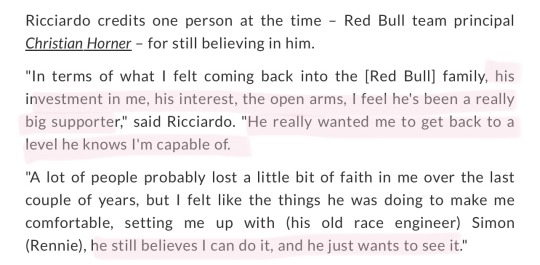

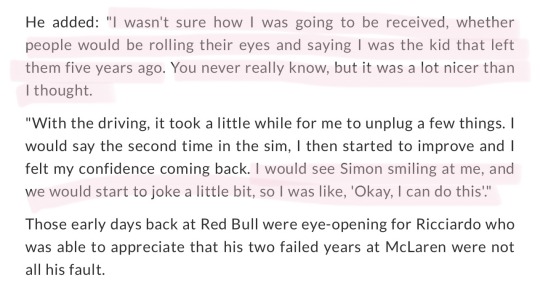


Ricciardo opens up on his McLaren departure: “I didn't care anymore" | Goodwood Road and Racing
#daniel ricciardo#m:sm#dan#red bull redux#HELLO???????#i know people have posted parts of this but it's NOT ENOUGH!!! THERE'S SO MUCH MORE!!!!#and even this i would say isn't all of it#the christian of it all!!! the simon of it all!!!! going back expecting ridicule!!!! so fucking loved and doesn't even know it!!! INSANE!!!#also that first quote about christian specifically mentioning simon is soooo like. simon IS coming back and daniel's gonna make sure of it#whether that's convincing simon to do it of his own volition or just reiterating over and over how impactful that was for him#to the point where OBVIOUSLY christian is going to have no choice but make the executive decision that simon needs to come back temporarily#just to help daniel ease the transition back#but of course all of this is happening knowing that the second simon gets a taste of that magic again there's no way he's giving it up 😈
181 notes
·
View notes
Note
My God I love your depiction of the Wittebane brother ❤️
Do you think there might have been a chance that your Pip wouldn't kill his brother when Calec goes to Demon Realm? He seems way more tolerable of weirdness and is actually curious about the taboo things. That it makes me wonder if other steps were taken by people around him, maybe he would make different choices and not turned into a brother-killing genocide goop man. Obviously, the blame is still his for what he did, but I can't stop wondering what if.
And him getting along with Evelyn instead of hating her right of the bat is really cute.
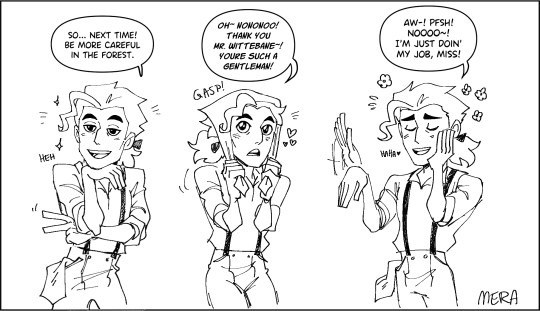
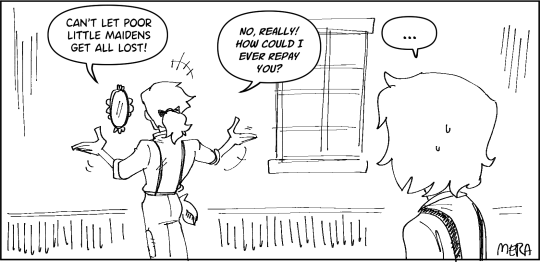
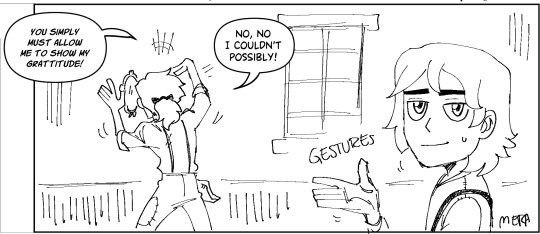
Thank you! :D <333
He grew up with this theatrical bisexual of a brother. Pretty sure the reason Belos didn't give a hoot on the Boiling Isles about queer stuff is because he kinda knew, and accepted, that Caleb was kinda queer. In some cases, people can ignore or bend certain rules for people they love. Even disregard them or pretend they don't apply or exist.
(long rant about writing and narrative foils and blah blah under the cut)
Unlike Caleb, I think Philip is the sort that only picks-and-chooses whatever rules he feels will supports his personal wants/thoughts and tosses the rest.
Caleb was not hiding it as well as he thought he did. lol.
I think that, sure, there was probably a turning point for Philip.
And absolutely, people around him influenced him. He's just a kid, a vulnerable one at that, in a protestant Christian cult.
I kinda like to think of it as a corruption arc. Mostly because it seems (to me) that the whole reason Luz was meant to have a depression-arc and Philip getting all "YoUrE JuSt LiKe Me!" thing was because.. There was supposed, I think, to be similar beginnings for them.
But Luz, in season 3, got depressed and felt a lot of guilt, so her arc is going from this happy-go-lucky kid interested in different things, to a depression arc where she questions herself. While Philip has a corruption arc, where he gradually goes from a well-meaning kid interested in different things, to evil and delusional.
I am also combining Luz, King, and the Collector into Kid-Philip's themes.
King is fascinating as a pre-narrative foil for kid-Philip. I think. As King was very clingy to Luz and didn't want her to leave, he too had a delusion about his own importance (disregard that it was kinda true in the end there). King tried to dictate (in that book episode) about what his and Luz' book should be about, how it should go, and it really hurt Luz' feelings. In the end, they solved it. But as a narrative foil, I think for the Wittebanes, they probably had a similar struggle on a larger scale, and it didn't get resolved.
The Collector, too! They're desperate to be close with someone, anyone, who gets them and wants to play on their terms. Kinda like Belos wanting him and Caleb to be witch hunters. Not accounting that Caleb is his own person outside of him-- Which, if you think about it, Caleb made his whole life (in my version anyway) about taking care of Philip. So I'm sure Philip felt like he really was Caleb's entire world. And then suddenly he wasn't. Because of a witch.
The Collector, despite having this incredible power (just like Pip having his brilliant brain) is still a child and using their power in selfish ways. Not intentionally, I think, just out of a fear of abandonment or isolation.
I personally am in favour of nobody-is-born-evil-but-anyone-can-become-evil kinda thing.
I would like to explore how Philip gets corrupted.
I am slowly influencing Philip in my fanfic with little things that will, eventually, boil down to not so great moments.
The thing about delusions is that the person truly believes in it. Philip believing he's a hero has to make sense and feel believable.
Belos is a jerk. Philip isn't, yet. He becomes that jerk. But I don't want to write a sociopath. I also don't like using less-favourable mental illnesses as an "easy way out" to write why Philip became Belos and a genocidal maniac.
I have strong feelings about de-stigmatizing mental illnesses in writing, without romanticizing them or leaving out the really awful and less discussed sides of it. This includes diagnoses within all the clusters of the DSM5. I will not sit here and say I only support a diagnosis like Autism or GAD, and not things like Histrionic or Borderline.
And including people with MH issues and personality disorders is important, too, as well as not trying to downplay them.
People throw around Belos with things like Narcissism and Psychopath, without actually understanding what those means or what the different types there are. For example, is he a grandiose, oblivious or a fragile narcissist?
Yes, these disorders are looked down upon. A lot of people who have them aren't very nice people. But that doesn't mean they're evil or have no heart.
Lots of children can display early signs of these, and in a rough time like the colonial 1630s of America, it is not unthinkable that those rough times bred some dysfunctional people. I'm sure Philip has his own slices of pie as far as mental health goes, just like Caleb and many other struggling people.
But, I will not write from an angle that implies Philip just has darkness from the start in him.
There's a reason why I had Caleb go on a rant about being born evil in chapter 5. Because puritans, and Christians alike, at the time - truly did believe bastards were just... Half people. Did you know that if an orphanage found out a baby was a bastard, they wouldn't let it suckle the nursery goat's udders. Because they were afraid it would soil the milk and, in turn, might give the non-bastard babies bad influence. Somehow.
With that kind of logic in your culture, it's no rocket science that people would put nonsense together and think it made sense.
I'm much more interested in how puritanism and witch hunting culture influenced and corrupted Philip into becoming who he became, and why he refuses to budge on his beliefs to the point of murder.
As the owl house, the show, has commentary on systems influencing cultures in a bad and positive way. But in particular, the one Belos tries to influence the Demon Realm with; being a not-so-great way. So! With that as a clue: what made Philip turn bad, most likely, was partially the puritanism and its extremist ways.
I think TOH is also a bit of a nudge at the HAYS-code of Hollywood and how it has trickled into most all the American culture-core. As it's both trickled into schools, morality, politics and other things outside cinema.
Just pointing at him and going "He's a sociopath because he became a genocidal tyrant" is, to me, cheap. Not only does it further stigmatising mental illnesses by implying only a disorder can make someone do such evil things. But it also disregards the most horrific truth of all; that the true monsters are people not at all unlike yourself. And that they, too, were children once.
#ttocw#caleb wittebane#philip wittebane#toh#the wittebane brothers#the owl house#toh fanartthe owl house fanart#toh comic#wittebros#wittebane#toh caleb#toh philip
361 notes
·
View notes
Text
Looking beyond the traditional interpretation of Ophelia’s Death:

Okay, @wokecola !
So, I wasn’t sure how to answer this at first because Ophelia has been analyzed so much, I wasn’t sure I had anything to break down that you wouldn’t be able to read somewhere else. But then! I was reading an article about the parallels between Anna Karenina and Ophelia (as they are similar characters - I will link the article), and this article opened my eyes to something I have never realized before in all the times I’ve read the play.
Shakespeare never explicitly tells us that Ophelia killed herself.
I’m sometimes guilty of accepting traditional interpretations at face value, but I was so fascinated by this point, I immediately changed my perspective on the character!
I always find Ophelia to be kind of a weak spot in the masterpiece that is Hamlet. She’s so, so strong in the first couple of acts. I dearly love her first scene with Laertes, and in many versions, her non-verbal blocking with Hamlet can make their relationship quite compelling. However, post-Polonius’s death, I struggle to connect with her grief. The best Ophelia I’ve seen is probably Jessica Brown Findlay in Andrew Scott’s production, but even the best Ophelia can’t overcome the stilted, awkward flowers scene, and the difficulty of singing madly on stage. The Public’s 2023 production’s choice to make Ophelia a singer throughout the play somewhat successfully mitigated this awkwardness, but… not entirely. This is just my opinion. But I’m always a bit taken out of the action when I hear Ophelia start to repeat ‘goodnight.’
All to say, Ophelia is an interesting case. Whereas Hamlet and Lear’s madness on stage, for example, both seem entirely natural, Ophelia’s… doesn’t. To me, at least.
But suspend your disbelief for a minute, and let me present an alternate theory.
What we know:
In act four, scene seven, Gertrude tells us that, Ophelia was making heartlands of flowers and stringing then around the trees when she “fell into the weeping brook” and continued singing in an unnatural way until her clothes got too heavy with water and pulled her “to muddy death.”
(I am obviously paraphrasing.)
But at no point does Gertrude state that Ophelia’s death was a suicide. It’s the gravediggers who suggest this, and in fact, I would argue that the grave digging scene weighs against the probability that it was a suicide, because the gravediggers specifically comment on how odd it is that she is allowed a Christian burial after taking her own life. They speculate on how else it could’ve happened.
So, if Ophelia didn’t kill herself, was it just an accident?
Well, let’s take this one step further.
I want to direct your attention to Act one, scene four, when Hamlet is pursuing his father’s ghost.
At this point, Horatio says, “What if it tempts you toward the flood, my lord? / Or to the dreadful summit of the cliff / that beetles o’er his base into the sea, / and there assume some other horrible form / which might deprive you your sovereignty of reason / and draw you into madness? Think of it.”
Okay. So. Do you see where I’m going with this?
Horatio is afraid that the ghost of Hamlet’s father will lure him into a body of water and drown him, or drive him to madness.
And what exactly happened to Ophelia again…?
Obviously this isn’t a watertight (heh) argument/analysis, but I think it’s fascinating!
Shakespeare, as we know, does everything for a reason. And Horatio’s fear is… specific. It’s very specific. Maybe he had knowledge of something like this happening before. Hell, maybe the ghost heard him and took inspiration.
My primary assertion here is that a ghost may have indirectly killed Ophelia. It may have even been the ghost of Hamlet’s father.
Additionally, Hamlet and Ophelia are, in a way, foils. When Hamlet’s father dies, he takes it out on others. When Ophelia’s father dies, she internalizes the pain and takes it out on no one but herself. Is it possible that she saw a ghost too? Is it possible that Hamlet Sr. wanted her dead?
I mean, we don’t know about Hamlet and Ophelia’s relationship before the play. Maybe Hamlet’s dad kept them apart. Maybe he didn’t approve of her.
We just don’t know.
The idea, to me, that Ophelia may have been tormented in the exact same way Hamlet was, is mind boggling and transformative.
I also love the idea that she didn’t kill herself!!
What do you think? Let’s have a discussion!
The article I referenced above:
https://www.jstor.org/stable/43909432
#shakespeare#william shakespeare#hamlet#dark academia#hamlet and horatio#academia#ask#hamlet x horatio#if we were villains#Ophelia#what was hamlet’s dad like before he died?
148 notes
·
View notes
Text
Handedness in DanAndPhilCrafts - Slime
A documentation and analysis of the hands that Dan and Phil use in the new Crafts video. Obviously some of this stuff is just due to filming and seating angles, but as with so much else about this video, I think some really interesting things can be intuited from it. Sorry if anyone has already done this!
This whole idea came from a post @lesbaurinkos pointing out that Dan - who's left handed - uses his right hand to sacrifice Phil, and comparing it to this exchange from Glitter Faces:
Phil: If you're left handed, ask a friend.
Dan: Why am I left handed?
Phil: Everybody makes mistakes.
This implies that there is something wrong with Dan's left handedness, and I've seen some suggest that this is what leads him to do rituals with his right. Others still say that perhaps this shows a transition of some sort, so that he is not the same person. While these are valid and interesting readings, I'd like to put forward a different theory.
Traditionally, the left hand has been seen as sinister (literally the Latin word for left, while the right was 'dexter'), so one would think that Dan's left handedness would actually be a boon for a Satanic ritual. It's a mark of otherness, of queerness, that was historically punished by a Christian society who saw it as deviant and wicked.
Indeed, it isn't just Dan who uses a hand different from his dominant one for ritualistic practice. Although we don't see Phil make the cut on Dan's hand, when he holds the knife, he holds it in his left hand.
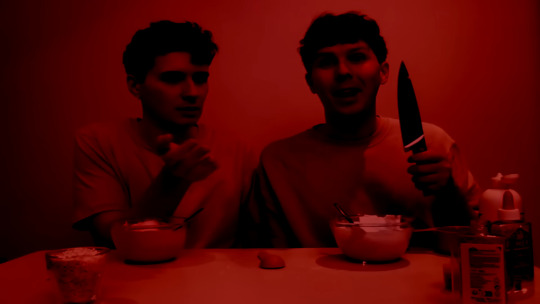
Likewise, once it cuts to the next shot, the knife is at an angle that suggests it having been put down from his left.

Dan's wound is on his right hand, and he uses this hand for many of the ritualistic elements to come, including - while still in Crafts mode - anointing himself and Phil in slime and holding the knife while telling us that He wants it 'straight from the source'.




This might be because his left hand is out of action due to all that blue slime on it. How did that blue slime get there? First, a word on the slime itself.
The two slimes serve different purposes. Dan's slime is intended to be a vessel and Phil's will be 'fun to touch'. Thus, while the red slime is only for Him, I would argue that the blue slime is for Them. After all, creativity is nothing without friendship.






That homoerotic hand grab with Phil - which squishes together the friendship slime, the same colour as Phil's eyes, as Dan points out - represents 'friendship' as the other force alongside Him. In this hand grab, Dan's dominant hand becomes covered in slime, leaving only his non-dominant hand for ritual purposes.

Interestingly, Phil is using his left hand here (his ritual hand), perhaps a sign of their differing priorities. I won't go into too much detail here, but I've seen others make interesting posts about Phil doing things for Him, and Dan doing them for Phil. This isn't too important here, as it's Dan's deliberate choices after this about which hand to use that become particularly interesting.
Indeed, after this, Dan draws the sigils on the walls with his right hand, and he also walks into the room to complete the sacrifice holding the knife in his right hand. If his right hand is his ritual hand, this makes sense.
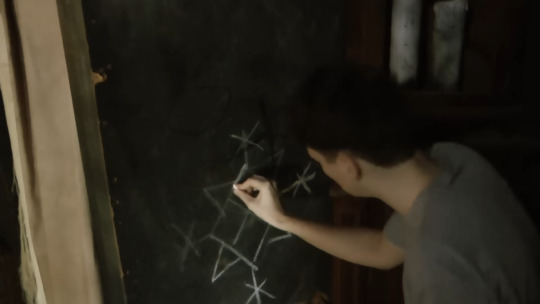
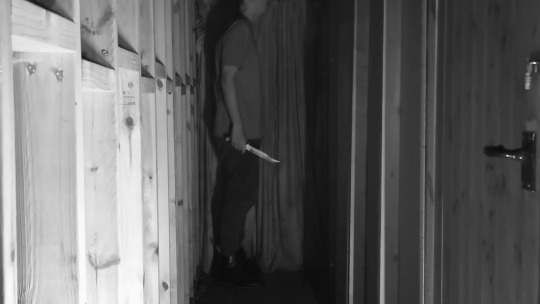
However, and I haven't seen anyone mention this yet, he leaves the room with it in his left hand.

I think this is fascinating, since - as with the cut in Dan's hand - we don't see what happens between these two shots. We hear Phil scream and assume Dan has stabbed him as planned, but we don't get to see which hand he actually wields the knife with. Going with my above thesis, perhaps this is because it is muddy and unknowable to what extent Dan is doing this for Him (the right hand) and to what extent he's doing it for Phil (the left).
We can also view this in contrast with the hand cut from earlier, where the discarded knife indicates that Phil completed the whole thing with his left (ritual) hand.
Dan also has a bloody handprint on his shirt, presumably from Phil in his final moments, and it's a right hand print. This is Phil's 'friendship' hand. Despite Phil's ultimate devotion to Him, during the moment of his greatest sacrifice, it is the deep intimacy of this act between the two of them that is most important.
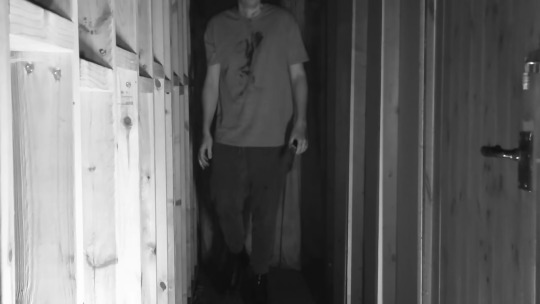
In the final ritual scene, Dan begins by holding the knife in his right hand (his ritual hand).

However, he then holds it in both hands, just as he holds Phil's heart in both hands a moment later. Both ritual and friendship are working together here, and he continues for the rest of the scene to use both hands to anoint them in Phil's heart's blood.
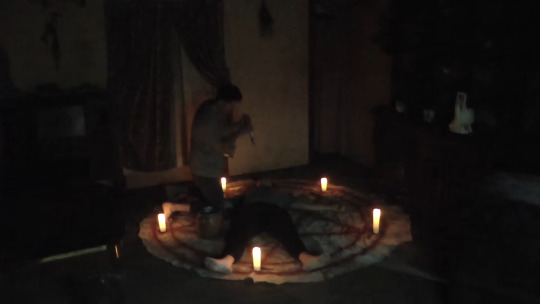


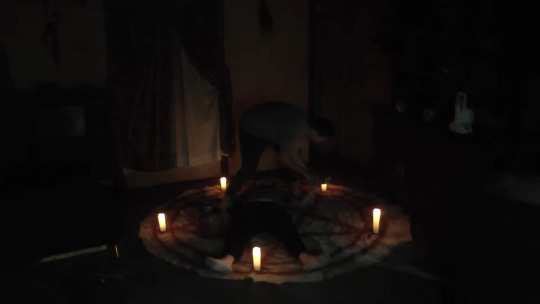
In the final shot, they are stood in their usual formation (Dan on stage right, Phil on stage left) and they each hold an item of ritualistic significance in their non-dominant, ritual hand. Dan holds Phil's heart in his right hand; Phil holds the knife in his left. What they each hold in their dominant hands is each other.
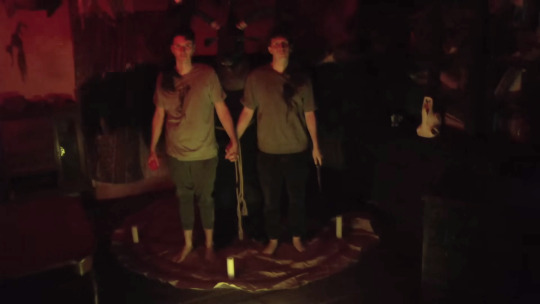
As a few others have pointed out, the rope of Baphomet behind them also evokes imagery of handfasting. That suggests that this is not just a summoning of Baphomet, but also a marriage ceremony of sorts. They are bound not just to Baphomet, but to each other.
A lot of this is, of course, because of their standard way round of sitting, so that their dominant hands are always between them, but it is fascinating that they made the choice to continue with this motif even once they were roaming free.
This is my final thesis, then, that throughout the video they both use their non-dominant hands for acts of ritualistic significance, while their dominant hands become important for their relationship. This is especially true for Dan, whose devotion often seems split between Him and Phil. Dan's left handedness could additionally act as a metaphor for queerness, so it's especially notable the way that this hand is reserved only for Phil.
Basically:
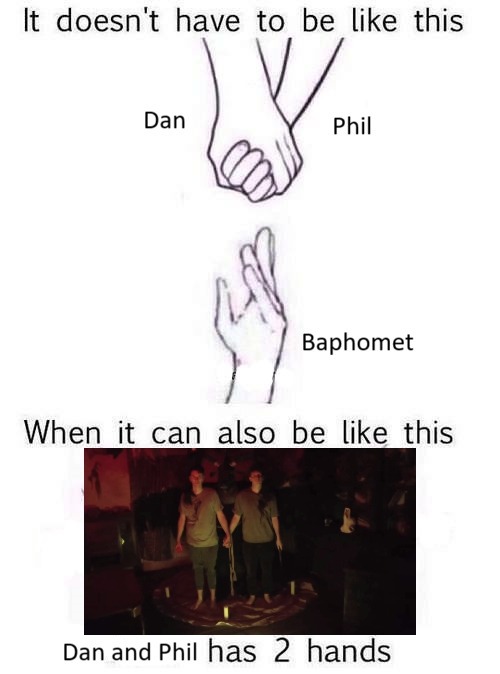
#dan and phil#danandphilcrafts#dan and phil crafts#dnp#phan#mine#this wasn't going to be an analysis originally#I was just going to log the ways they use each of their hands since I'd seen discussions of it#then I realised I had Thoughts#now mayhap I should get on with writing the two actual marked essays I desperately need to start on#also I hope you're pleased with the meme at the end#I'm really proud of it
77 notes
·
View notes
Text
Q!BBH AND RELIGIOUS ICONOGRAPHY
Ok I said I’d make a longer post about it, so here it is. I just find it so incredible fascinating how Badboyhalo has chosen to incorporate religious symbols in his base, specifically the ones he has chosen to include. All of the symbols he has chosen are associated with death in some way. Unsurprising, considering he has heavily alluded to being the grim reaper. But, what I really want to focus on is the fact that the chosen symbols have a much heavier focus on the transition into death rather than death itself.
Let’s start with the easiest and most obviously one: the halo chandeliers and the wings sprouting from behind the throne. Angels in Christianity have served a large variety of roles, but the two I want to focus on is them being heralds of death/disaster and escorts of souls to heaven. I’m sure the herald angels relate back to BBH alluding that he caused great historical disasters such as the Black Death, but because there’s so many instances of herald angels I’m not gonna focus on any specific one.
Who I do want to focus on; however, is the angel of death Azrael. He’s sort of your classic biblically accurate angel with the many eyes and wings and all that, but his main job is to separate the soul from the body. He is unaware of when a human will die and only acts when he has been told (something about a leaf with that person’s name on it falling from the tree under God’s throne blah blah). The interesting note, though, is that Azrael stands on the bridge between paradise and hell. I point at the bridge leading from what will be the warp room to BBH’s base into the rest of his home. Now it’s your choice how you interpret which side is supposedly paradise and which is hell. Personally I could see an interpretation for either. Now back to angels. After Azrael pays you a visit to grab your soul, he hands you off to some guardian angels. Who those angels are varies based on what sect of Christianity you look at; some say Archangel Michael escorts you, others say it’s your personal guardian angels. Nonetheless, they act as escorts for the soul to the afterlife. Sound familiar? BBH has stated or implied (it’s been awhile I can’t remember if it was outright stated) that he helped guide the eggs who had died to the afterlife.
Now the next religious symbol is probably the most closely tied to the transition into death. BBH’s river of souls is heavily inspired by the River Styx and its ferryman Charon. Charon’s job was to ferry souls who had received burial rites across the rivers Acheron and Styx. There is some debate about the mythos of each river but for the purpose of this post I’m just going to refer to them both as what separated the world of the dead from the living. The main point here is that Charon ferried souls from the land of the living to that of the dead, where they will be judged and sent to whatever part of the underworld Hades would deem fit. Again, we are not quite seeing a symbol of death itself, but more of that transition period. What happens as the soul leaves the body and is on its way to the afterlife. And again, I point to BBH implying he guided the dead eggs. The interesting part here, though, is that Charon did not work for free like angels. When one received burial rites, they had a coin placed in their mouth that would serve as payment for the ferry. What I’m curious about is what BBH would consider payment if he’s considering it at all. It could possibly explain why he’s gotten away with so much without a serious step in from the Federation? But then again I could be looking too far into it lol.
The last symbol I want to talk about is interesting because it represents both life and death. The Ankh that BBH designed his rooms to form can been seen with a lot of important Egyptian figures. Pharaohs and kings were often depicted with them to preserve immortality. Egyptian gods such as Osiris, Iris, and Ra are all seen depicted with it. Important leaders were often buried with them to take to the afterlife to live a sort of life after death. The thing of note to me, though, is that it commonly represents the ability of gods to revive souls in the afterlife. This symbol isn’t so much a symbol of transition, but one of defiance of death. I included it in here because I find it appropriate that BBH, the one to consistently care for the eggs when no one else can, the one who has probably done the most to set up every safety measure he could to protect them, the one who feels most responsible for their disappearance, would be the one to adopt this symbol. Ngl the part about reviving souls gives me hope he can find a way to bring the dead eggs back, but that’s largely me coping and I doubt that will actually be possible.
Lastly, I just find it interesting that BBH adopted the Grim Reaper specifically as part of his lore. It’s a very vague concept not cemented in any one religion. Often, it’s never really associated with any one afterlife, just the act of dying itself. Idk I find it extremely noteworthy that BBH has not quite adopted the death aesthetic, but has instead integrated his lore in that transitional period. Not necessarily the afterlife, but the act of dying itself and that journey one takes to the afterlife.
Anyways if you read all this thanks for indulging my rambling lol. I just love love love symbolism in media especially religious symbolism. If I got anything wrong or I missed something please lmk and I’ll fix it!
97 notes
·
View notes
Text
okay fine. I need people to know this.
I feel like most tbhk fans are Christian from America and Europe. So they probably don't really think about the religion in tbhk but it actually has such a big role.
I'll get straight to the point, all of tbhk (or at least main charactes and the plot) is revolved around the worship of Kami ( 神 ) gods, spirits and supernaturals alike.
ThE most obvious ones are the seven mysteries themselves, yako in a kitsune (litterally fox) a fox spirit/yokai whom like to pull pranks of humans either by shaoeshifiting, seducing or even killing at points, this can be seen in yako's sort of cocky personality. Yako is more specifically an Inari statue of an Inari temple for the goddess of agriculture, they say it protects crops and foxes.
Tsuchigomori is a tsuchigomo (literally earth spider) it's a giant spider who can be at least as tall as 10 meters. In one story, minamoto no yorimitsu (or raiko) killed one and had found multiple skulls inside, obviusly implying that the creature eats humans.
Hakubo is an Oni, a general word for demonic creatures in Japanese, thought I can't pin point which exact one. Another story involving yorimitsu is the drunken demon, when hakubo was found by the exorcist he said to have given the biggest Oni poisoned sake, as the real story says that three old men gave yorimitsu and his men sake that revealed the oni's real appearance but didn't hurt humans because he prayed at 3 nearby shinto shrines, and later slashed his neck like in the original text.
Hanako is straightforward but it is different in almost all prefectures of japan.
The gist of it is that hanako was a little girl who died either by herself of by her classmates in the girls bathroom around 5-10 years old. She can grant your wish but is you make her angry she'll curse you with a painful and slow death that'll happen very soon. One prefecture even says that she died in the nuclear blast during the last years of ww2.
Im not sure where nº3, nº1 and nº4 come from.
Now Onto the more subtle details, you might ask "hold up Roy, but Japanese buddhisim is very in touch with supernaturals aswell, how do you know if it's japanese buddhisim or shinto?"
Well let's talk about the minamotos. As you might've read, yorimitsu killed many yokais, so he would be called an exorcist where now are kou and teru, the staff kou has is real and is in some temples, teru's bracelet wards off evil spirits in shinto (rather not talk about the Buddhist thoughts on it....) .well teru's blade is obviously not real as a sword like that would've been impractical.
The temple where Teru and Akane go during the severance is a shinto shrine, we can see this from the Torii gates and the architecture as well. The workers at the temple are also not bald therefore they aren't Buddhist monks. It was also very customary to serve tea to the visitors. On the front gate of the shrine there at this 'weird Rope' with papers attached on it, it's on most temples and its a direct reference to a story involving amaterasu , the sun goddess, wich i wont get into.
The train to the farshore is actually a story itself and the place being full of water isn't just an artistic choice but it rapresents the river to the farshore.
Haha wow this is all to conviniet, yeah I believe in shinto bye I'm writing this in the fucking school bathrooms. Need to start school soon bye.
#tbhk#jshk#toilet bound hanako kun#tbhk analysis#jshk analysis#Shinto#Tbhk theory#Jshk theory#I'm tired#I have a presentation of 34 slides today#Bye bye
47 notes
·
View notes
Note
Heyyy
What are your thoughts on religious symbolism or just religion in general in the story? Cos I started reading the books and was really surprised by how much the characters GET INTO IT lmao it’s really present in the story in a way the show mostly shied away from after the first episode I think, other than a couple exceptions it was mostly not explicit except a few references to hell.
Sooo I’m pretty hyped seeing some crucifixion imagery in season 2, I suppose I makes sense that Louis would be having a religious reckoning after losing lestat, and Armand is a character really defined by his faith so it will be interesting to see how deep they go with it. What are you hoping to see?
Hey!
Yes, there is a LOT of religious symbolism in the books (Anne struggled all her life with it, and that is threaded through).
Lestat (and others) has a rather complicated relationship to the divine. In Memnoch he literally encounters God, and drinks his blood.
Lestat is often likened to Christ in the books, something the show has obviously picked up on. After his ordeal with Memnoch he is bound and raving mad before he quiets into a coma, in a chapel.
(Young Lestat wants to become a monk/priest, prays to be released from his abusive family, shivers at the vicious futility at the Witches' Place.)
We have other characters who come from a vastly different backgrounds, too, like Marius in pre-Christian Roman Empire, or in the extreme (in a way) Akasha and Enkil in ancient Egypt, building themselves up to (Blood) Gods. For example.
The show has given Armand a muslim background, Daniel might have yet another one, maybe jewish.
I do not actually think they're shying away from all that - but they are giving themselves time to reach the important points here... and, of course, season 1 being told by Louis, put the focus somewhere else, because Louis actually did not wish to think about all that too deeply. Or, better, address it.
Now Louis obviously believed ... enough. Enough to feel deeply and utterly tortured about it all. I think that is true for book and show, and the show has taken the book comment and made it literal:
"What would Christ need have done to make me follow Him like Matthew or Peter? Dress well, to begin with. And have a luxurious head of pampered yellow hair."

Louis goes and runs to church when all else fails, in desperation. He kills the priest there, in the book.
Louis... will lose his faith in god, or, maybe better, switch it over to Lestat as his god, book canonically. (And he struggles with this, for a long time):
"He leaned close to me, and he put his hand on my arm. “ ‘Wither thou goest, I will go, and where thou lodgest, I will lodge; thy people shall be my people’; and because I have no other god and never will, you shall be my god."
Armand has also spoken of "I serve a god", which might be a callback to the events surrounding Memnoch. And, as you say, he is deeply defined by his faith. It will be truly interesting to see where they go for it in the show - how they go for it.
Of course the image of Lestat as if on a cross is imbued with meaning.
Louis himself later mediates on the fact that he "hated Lestat for the wrong reasons", and that the feelings that Lestat arouse in him did not have "hatred among them".
Lestat has been murdered, for sins he did not commit(*).
(*)Of course there is plenty to say about that - and Lestat himself never blamed Claudia! - but that which they (ultimately, simplified) hated him for... was not his fault, not really.
Vampirism never freed any of them, it simply could not, and Claudia didn't have a choice in any case... and eternity is a long time to build up emotions. Or hate. (Or forgiveness.)
And so Lestat as Christ on a cross... calls back to that, in Louis' imagination.
So what I hope to see... hmm.
I don't think they'll put Memnoch into the show. I think if anything then Memnoch or a Memnoch-like event has already happened.
I hope... that we will get to see the characters struggling with their faith - or lack of it. I hope that we will get to see Lestat destroy the Parisian coven and the satanic cult there. I hope that we will see Armand struggling to find something to hold onto (and find it!). I want Louis to free himself from the shackles of catholic guilt, whether they go book canon or not. I want Lestat to make his peace with the Witches' Place and the futility of it all, the "dark" moment. I hope that we will see characters reflect and mirror the perceived truths of faith - and destroy the preconceptions.
I want all that.
I hope for all that :)
We'll see if they dare, but... I'm carefully hopeful^^.
Oh yes, and at the end... I want them to find their peace in their own religion, as in the books... their "Blood Communion".
#Anonymous#asks#ask nalyra#amc iwtv#iwtv#amc interview with the vampire#interview with the vampire amc#iwtv amc#iwtv 2022#interview with the vampire#religious symbolism#religion#christianity#book quotes#blood communion#louis de pointe du lac#lestat de lioncourt
13 notes
·
View notes
Note
every1 that voted rinne as worst husband is so wrong... its literally canon that he cares SO much and fakes his insane persona hes just awkward and embarassed when he gets noticed
i have so many things i can say about this but im really bad at words but theyre stewing around in my brain explodes
what were your thoughts?
i do agree with the ones that mention niki haha those are true rinne is absolutely smitten but the ones that say its like. because hes rinne amagi. and others thay were probably filtered out by the OP... people that either didnt read the main story or just dont want to look further lmao
(cracking my fingers) okay. this may or may not be long. i fear you have struck a bit of a nerve with this (NOT YOU but just as like. a general statement. i feel like u dont know what ur asking. but that is ok)
this whole thing might seem really aggressive at times bc this situation did get me a little heated... plz keep that in mind going in! AGAIN IM NOT ANGRY AT YOU ANON ILY AND THANK YOU FOR ASKING you just happened to ask abt smth i feel very sourly about – not the poll itself but the answers to it – but i tried to be as. tactful as i possibly can while talking abt this
overall im very disappointed in a lot of the answers given for the voting so ive stayed off twitter almost all day today and yesterday. i fear like with stuff like this a very silent population of eng side shines through, the one that specifically Doesnt actually engage with the story and goes off fanon interpretation. look, im not saying its necessarily a bad thing. but when it comes to stuff like this, where people grossly mischaracterize a grand majority of charas or narrow them down to be the butt of a joke, or use it as an excuse to be plain racist/ableist, i feel like people really need to reassess where all of this is coming from. like. not rinne, but KANAME couldnt even be included because the answers used for his votes were, in their majority, apparently ableist, and op (definitely in the right, i think this was the right choice to make) chose not to post at all because they feared the qrts would be just as bad. because for some reason people seem to think that because they're fictional characters that being ableist is somehow ok, that saying they would "pull the plug" on charas like him and eichi is fine because theyre not real people – as if there werent disabled or chronically ill people in this fandom, in every fandom, or hell, around you?
and lets not mention tatsumi and people blatantly misinterpreting his christianity as something he would force upon others – first of all, western christianity does not apply to tatsumi. at all. i understand that people might find it easy to just associate him with that and make "haha, he would make me convert" or "haha he would be a homophobe" quips, and obviously its not necessary to have extensive knowledge on kirishitan history in japan and how they are, to this day, a minority that was persecuted for a lot of japan's modern history. LIKE, EVEN FROM HIS DIALOGUE IN ANY STORY.. when has he given off that impression? cite your sources, he's literally one of the most inclusive and accepting charas in the whole cast! not a prejudiced white christian middle aged mom...
i think that if you absolutely must reduce a character to tasteless jokes, stereotypes that arent even funny to begin with, and you refuse to even read the source content at all to correct yourself, you really need to think about how you engage with any media, not just enstars. if you want to look at the pretty characters just say that! but dont be like this, and don’t speak on things you don’t fully understand as if you did just to make a point or be funny!
OKAY RINNE SORRY LOL i hate it. i hated all of it and judging by the ratio many people seemed to dislike it as well (god bless!). if you havent seen it i wont link it bc tbf i dont feel like looking at it again (peace and love) but the answers summed up are like "oh he would steal my money" "hes selfish and would take stuff from me and not gaf about my wellbeing" "hes married to niki already" the last one being the only one i agree with. and it makes me think about a lot of issues with how a good portion of the fandom sees rinne. ive seen a lot of people read rinne in bad faith, regardless of whether theyve read main story, hot limit or any story rinne is in. and i dont get it, genuinely. YES he can be upsetting! he can be an asshole, he can be rude, he DOES steal money from niki! but these people neglect to see or mention that he gives it back and then some. they fail to talk about how he spends a lot of his time trying to make niki see his self worth!! since hiiro was BORN he's been trying to get him to understand that he's deserving of love!! that YES he can be a dick but ultimately treats crazy:b and his friends with love and wants what's best for them! these are the same ppl that think he's abusive or something idk i can only assume. like yeah rinne has a carefully crafted persona where hes a complete dickhead and ig some players cant really bother to see past that act
unfortunately rinne himself is built on a few harmful stereotypes of ainu culture irt the drinking, being portrayed or viewed as more 'uncouth' by other characters, etc which is why the initial more explicit ties to ainu culture were removed altogether from his and hiiros design and background. it is understandable, which is for example why it's not really my place to say whether he can be interpreted as ainu or not, and even so, i try not to rely on those aspects of him because it still veers into sensitive territory. and its an unfortunate part of his character, but undeniably, rinne amagi DOES drink, (he's one of the only characters in main cast of drinking age anyway) does partake in harmful behaviors, but fsr suddenly that means hes nothing but a drunkard, to a lot of people. when reading rinne you really have to take these things and ofc, consider that theyre relevant to his character, but it's not all there is...? in the slightest..? there used to be a tweet thread explaining this link further but it's either been taken down or the account has been locked. either way, just a bit of googling goes a long way. i'd rather not go into too much detail here because i don't feel informed enough beyond pointing these issues out, and i personally feel like it's not really my place. if anybody wants to add onto this post to cite more specific sources please feel free
he's such a fun loving, cunning, caring guy who helps people get jobs (dance of the white tiger), who volunteers to play with kids at a daycare (asobi), and wishes so badly to become an idol and grant everyone the same opportunities if theyd like to be, as well (main story, sudden death SUDDEN DEATH IS MY FAV STORY AFTER HL BUT THE TL IS DOWN....SORRY. but i really really think it's one of the most important ones when it comes to rinne's character and motivations. also if u can read it in app it's even better bc it's voiced and theres a line where he's like "oh this guy's [niki] is engaged to me" when talking to kohaku's sister AND HE SOUNDS FULLY SERIOUS TOO....)
don't get me started on people who dumb him down as if he wasn't one of the most clever characters in the game. and unknowingly, people that continue to make rinne's character out to simply be a gambling flirty drunkard who doesn't know how to control himself, as if there weren't other facets of him – they lean into stereotypes, bordering on racism, even if its not malicious or theyre not aware. and it makes me so sad. a lot of the time these interpretations are spread around and then liking characters like him becomes some sort of moral debate, esp in current fandom (which is one of the reasons i think this stereotyping? happens? b/c ive found that fandom sometimes has the tendency of grabbing characters and mischaracterizing them so BADLY that liking them makes you a bad person..? not necessarily villains either! i promise it's okay to just dislike characters without making stuff up!)
that aside also suggesting he'd be an awful, neglectful spouse is simply incorrect. i very firmly believe that if rinne is devoted, he will drop every vice, every pretense, to make the other person happy. he's Like That in the story and towards niki because they keep tiptoeing around the subject but the second he gets an inner monologue, or is truly being genuine, you can tell he would do anything for him, if niki would just let him. to say that rinne isn't capable of being a good partner because he'll treat you badly or not care about you just proves to me that you're not reading any scene he is actually in. if rinne loves you, romantic or not, he will go big or go home. read hot limit btw
im not about to pull the story caps out no wait yes i am lol rinniki4ever ✌️
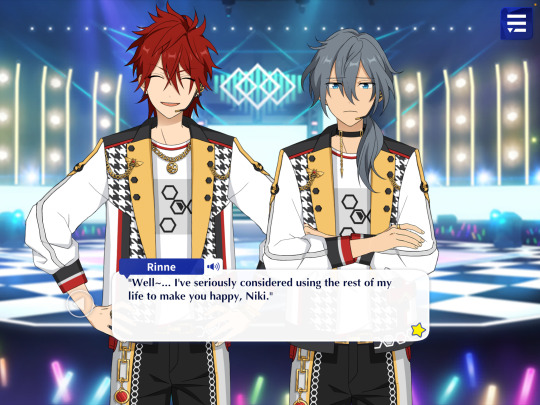
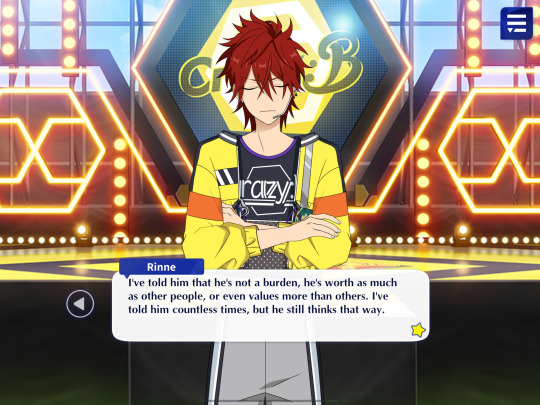
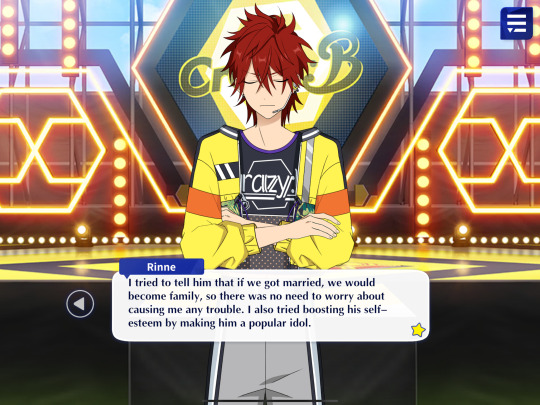


these arent in order bc i had to scroll up like 2k pictures because i take caps of this game every time i blink. i was considering adding hiiro caps, to show his dedication to him as well, but given that this is for like a marriage poll id rather not. either way he cares about his family and loved ones a lot. read chapter 155 if you want to know the exact scene i was thinking about/referring to while typing this
um ok (breathes out) im fine now. theres things i didnt address because it's 1 am and i want to go to sleep. congrats kuro on getting #1 most marriageable tho u deserve it KURO NUMERO 1 CAMPEAO DO MUNDO 💯💯💯🔥
#im not tagging this with anything else#im sorry if i sound snobby or just. idk. mean at all. it isnt even a matter of media literacy anymore its more like#sometimes interpreting stuff on such a surface level and having to make jokes out of everything is not the best way to go#especially when the jokes are harmful/offensive. you dont really see this behavior outside of eng fandom#this isnt meant to be scolding i just wish people understood!!#but like if people say something is offensive rather than just doubling down...listen? please#im not an authority on enstars obviously i havent caught up on anything non alkakurei since like 2018. these are just my thoughts#if you read all of it i appreciate you :)#its not that serious. unless youre being purposely ableist and or racist which in that case it is that serious#mimthinks
111 notes
·
View notes
Note
What was the book? With the Definitely Real Banishment
Spoilers (obviously) but it's the Lightbringer series. That villain was pretty good! The word-by-word writing is fine! The plot is, for several books' worth, aimed at being Very Generic Fantasy (for reasons that will make sense later). Incoming long post about its philosophy, with even more spoilers.
It's not often that I read a book and immediately go "I can tell you what kind of middle school this author went to." In this case, it was drawing on the author's experience of exactly the theology I grew up with, which was almost eerie.
(I read book one years and years ago, and didn't retain much other than "cool magic system." Probably everything in this post is true about book one as well, but I wouldn't know.)
Google will tell you that the series gets gradually very Christian, to the point where the climax of the last book contains a sermon. But it's more specific than that. These books scream "Protestant, American, classically educated, does not travel internationally very often, male, straight, probably white, the kind of person who would vote straight-ticket Republican until that meant Trump at which point all bets are off." I did not bother confirming most of those. They're just obvious.
The loudest part--to me at least--was the "classically educated." (If you're not familiar, it's this thing.) The series would mention quotes from fantasy medieval Catholics or fantasy ancient Greeks or whatever, and I'd recognize the quotes or the names because they'd be real people I ran across in school. Sure enough, author went to Hillsdale.
Lightbringer is interesting for having an actual vision of a conservative society, not just about hating the right/wrong people. Not being on that team anymore I don't actually like this vision very much, but compared to current conservatives, credit for having one at all.
Differences between people obviously don't affect your value as a person, they just might make it easier or harder or mean you have to specialize differently to accomplish as much For The Group.
(That opinion makes perfect sense for characters in an elite military unit/training for that unit. But that context is mostly specific to book two, and the philosophy really isn't.)
This applies to everything. Physical condition, including strength/weight/gender. Color-blindness. Superpowers. Being straight. (I'm genuinely not sure if that part was intentional. Characters kept getting distracted at terrible times, and the narration outside their head sounded exactly the same as when someone can't run a mile without Trying Very Hard.)
It does not matter whether your mental illness turns out to be literally demons in your head. Either way you've still got to either work through it or specialize around it.
Tradition matters, even when we don't understand the reason behind it.
If you happen to be in a fantasy book and have access to magic, consorting with demons is evil but fancy physics is fine. You can just BET this author got into fights with other Christians about whether Harry Potter was anti-Jesus.
"Irredeemably bad" isn't really a thing. "Not in fact going to be redeemed" is, but it's worth trying to show mercy if you have the chance. If you don't have the chance, kill 'em. Don't enjoy it, though.
Forgiving people for actually-bad things is hard, can't just go "idk, they're good guys now," but it's also important. (I do think this is underrepresented in secular fiction, where it's either depicted as "how could you work with THEM" or "come on, get over it already and team up against the whatever.")
One of the big reveals at the end is "the Christian God is real." The answer to the problem of evil is indeed the popular answer in the denominations I grew up with. Human choices something something mumble free will.
Very incrementalist. You do as much good as you can as fast as you can, but obviously without overthrowing the entire order or anything. Only evil opportunists would want to do that. Yes, even if the existing order is corrupt all the way through.
Speaking of which, you know that organization/political entity claiming to represent God? Corrupt all the way through. God is more personal than that. Protestantism!
Personal morality matters. Your leaders absolutely must be good people, or at least trying to be, or you're screwed.
Personal morality matters. It is safe to assume you'll end up as exactly what your peers expect of you, so pick good peers.
A man should be faithful to one (1) wife. Viewpoint characters speedrun figuring out the philosophy behind this.
(IMO monogamy was a legitimate human rights win by early Christianity, relative to what came before, and I think something similar applies in this setting. But since the real-life alternatives today are so much better than women being property, giving this a lot of screen time sounded like the book is fishing very hard for things historical Christianity did right.)
Also, once you are married you Are Married. It's not that changing that would be unthinkable, just that if you do treat it as an option you're obviously doing it wrong.
Gay people don't exist. Any variety of non-straight, really. Nobody says that it should be that way. It just doesn't come up. Characters are written in enough detail that I can tell you how they'd react if you asked them, and it's mostly the "not my business" + "prefer not to think about it" kind of low-grade homophobia. A few would be explicitly okay with it. But it does not come up. If there were a gay relationship depicted, I'd expect it to be "coincidentally" problematic in some other way.
(I guess there's that one slaver-antagonist whose sexuality is just "sadist." Yeah, one might call that problematic.)
Practically dripping with Great Man Theory of History. There's a scene where the protagonist has a self-affirming/emotional moment about not relying on his family name and meritoriously earning his first kingdom. This is played completely straight.
Don't worry, he uses it for good. At least as much good as he can without overthrowing the existing order etc.
If there are end times prophecies, they might well be true but you can't trust any specific interpretation so it's wiser to just do your best without reference to the prophecy. (This is an interesting take! And not heresy but also not common! I bet the author's reacting against some interesting strains of fundamentalism there.)
A cool idea where angels and demons can be anywhere in any world at any time in history, but are very reluctant to actually do that because they can't pick the same time twice. You can just tell it's the author's Christianity headcanon.
You win by doing your best and having faith in God. The villains are very much a sideshow.
(I think if everyone followed this book's philosophy more it would be a mostly bad thing. Let's not do that.)
(But wow, I wish modern conservatives were only this bad.)
It probably sounds like I didn't like this series. But I did read five doorstoppers' worth. This post is just about the opinions, and the opinions sucked.
Anyway. This has to be on purpose, right, and 10 or 15 years ago I was pretty much the target audience for this. Guess I'm old.
I used to explicitly think "I'm Christian, but atheist fiction is more interesting," and this book is the kind of thing that...tries...to counter that. Fails, because resolving major conflicts with divine intervention is tricky to make interesting. But you'll see why it's going for Every Other Book, But Christian. (Also, the amount of sex in these books is much higher than you might think, given everything. I wish I knew less about what body types the author is attracted to.)
Anyway, I can't really say I would recommend it. But if you're interested in what would happen if Card or Sanderson tried to be Evangelical Lewis for adults, Lightbringer isn't bad.
30 notes
·
View notes
Text
I just want to make clear something
Vampire Books I'm Interested In
literally anything platonic, ZERO ROMANCE. The zero is very important. Not low. Not a little. Not background. Zero. None. Nada. 전혀 없어야데.
if it must be romantic, at least it shouldn't take itself seriously or be Dramatic and Thematic or have the romance NOT be between the vampire and human. The vampire should be their weird friend who sometimes bites whipped cream cans or honey bottles as a nervous tic
Blood, Gore, Violence, Viscera, Alllll the Guts and mess
if there must be an age gap, consider how funny it would be if the human was older than the vampire
"i am not a vampire. Vampires cannot be Christian. The fact that I hate sunlight, hate garlic, and that my hand is burning as I clutch the cross around my neck that is ONLY BY FASHION CHOICE covered by a turtleneck is NOT AN INDICATION OF ANYTHING!"
if there must be a sexy blood drinking scene, consider how funny sexy it would be if the vampire sips his blood from a wineglass like some tired, adhd, chaotic lawful detective trying to crack a hard case because obviously there is nothing sexier than that
"no. I'm not 'magic.' I'm actually a biological construction created for the purpose of carrying different bloodtypes in me to administer it in emergency cases during this space and matter war. The fact that I am a failed product does NOT negate the fact that I'm not magic. I am *science*" which is to say sci fi vampires
Honestly, just go back into the original lore of vampires and make them bloodthirsty but so calculating. After seeing what Frieren did with demons, we really are missing out on monsters who use the power of words to lure in prey
Vampire Books I'm NOT Interested In
"Bloodsucking is so sexy and intense and dangerous. You want to let me suck your blood so bad. Literally. Please. I will die without blood." Go get a blood transfusion and stop gaslighting women with your easily preventable life or death situations. No, I don't care if vampires are illegal citizens. Just rip out the government leaders' throats and establish a tyrrany where an adventure begins where peoole realize that revenge and violence only creates cyclical cruelty and -
"I will reform this vampire through the power of love and blood."
If it has a shirtless man cover and/or a couple cover, I am automatically suspicious of it
Yes that DOES mean Magiford falls under this. My point stands
However, I will read any and all of these if I'm feeling evil enough and need a victim to target
#lemon duck quacks#for the words!#by the way i want to also make VERY CLEAR this is NOT targeted at people who gave book recs in the vampire post tag#it was inspired by them but it's not targeted because i don't actually judge books by cover or romantic content#even though experience tells me I really REALLY should#also i doubt any of those recs were directed at me#anyway i drafted this but what made me want to post it was my beautiful daughter WHO SHOULD NOT PERPETUATE VAMP STEREOTYPES#i have 393 drafts guys. i am ill#i know most of those are reblogs but....help#lemon duck tales
8 notes
·
View notes
Text

The director of Sound of Freedom (full disclosure: I haven’t seen that movie), which became the darling of A Very Right Wing Audience, made a movie starring a saint, the message of which is that the system is terrible to immigrants in the US, and you shouldn’t treat them like trash.
I have a lot of thoughts, guys.
Cabrini tells the story of Mother Saint Frances Cabrini, an Italian religious sister who wanted to start missionary orphanages in China and wouldn’t take ‘no’ for an answer. The Pope convinces her that she start working in the West, first–specifically in New York City, where Italian immigrants live in slums and are shunned by the populace, including the local diocese’s administration. Undaunted, Mother Cabrini charges forward to build her orphanage, whether or not she’ll get support from the city, the press, or the Church.
I kind of want to talk about the critical conversation that surrounded this movie.
Obviously, a film featuring a saint as its protagonist will get attention from Catholic outlets, and that’s where I saw most of the reviews. There was a noticeable common thread among Catholic critics that even though it’s about a canonized saint, a religious sister, and the character’s explicitly Catholic in the movie, her faith is not explored as her motivation, and it doesn’t really emphasize God working through her. We Catholics do not believe that we accomplish holy tasks based on our own power–we do it through God’s grace.
This movie, on the other hand, understandably makes it so that Mother Cabrini is the prime mover of events, though she certainly does have faith. But for Catholics, her reverence for God should be more emphasized, and her crediting and trusting in Him should be more explicit. I understand that in order to make it appeal to a wider (if still primarily Christian) audience, this was toned down, though I don’t know if it was the best idea.
My family and I also noted, while watching the film, that Frances Cabrini’s backstory is not really explored in a comprehensive way. Okay, fine, the movie’s not about that, and there’s enough to go off of. What’s a little more frustrating is that the sisters she leads in her efforts at building an orphanage are… look, I don’t know if they even have names in the film. I don’t remember much about them, other than that they’re there to back up the main character.
There are, however, not-so-legitimate criticisms I’ve seen. The Pillar talked a bit about it in one of their posts, but did not go into a full review because their writers are reporters of Catholic news (and they do very good work on that front, being unafraid of talking about scandal and asking hard questions). The opinion of the editor there was that, along with the above criticism, the antagonists were caricatures of patriarchal corruption, being essentially douchey men, which he felt was putting all the problems faced by the characters on men.
Which… yeah, because she’s running up against corrupt or uncaring systems and institutions, which at the time are all run… by men.
Maybe this is because I recently read Burn It Down, but taking issue with this feels like missing the point of the movie. You can say all you want that the systems in place aren’t just the fault of some men in charge, but those men in charge hold a lot of responsibility. Immigrants aren’t suffering in the US because the system has to be that way, they’re because people in charge choose to make or keep it that way to benefit themselves. The movie simplifies how these systems work, yes, but that doesn’t change that depicting them as the result of prejudiced, greedy, and corrupt men is not a bad choice.
Like, imagine if someone complained that Hidden Figures uses caricatures that are too simple for the reality of what happened. Yeah, that’s true, and there are definite issues with those depictions, but is it wrong to do that in a movie? I don’t think so.
[And then at least one person in the comments of that post angrily claims this movie constitutes “militant feminism” which makes me see red. Do words even have meaning these days? I feel like every time a film with female leads has a douchey male villain, some whackjob claims that it’s a story asserting that all men are evil.]
If the figures depicted in the movie actually were generally alright people, and the film is villainizing real people unnecessarily, then yes, we have some problems. Otherwise, I’m fine with it.
I am also kind of stunned how much this movie comes out swinging on certain issues. Again, the director’s previous film was a movie that got a lot of attention from right wing media, and this is one that depicts things like racism against immigrants, police brutality, political corruption–things that I don’t think FOX News is as keen on talking about. I think audiences cared enough about it for this movie to be mildly successful, though, which shows that, thankfully, people aren’t on as strictly drawn socio-political lines as the media would have you believe.
This is a fairly powerful narrative, guys, and it does not hold back. There are wealthy (white) New Yorkers complaining about how “brown children” are running through their streets, people denigrating others for not speaking English, and pointing out that the people oppressing immigrants today are the descendants of immigrants who themselves went through oppression when they arrived.
I like that the movie does not flinch away from that: showing that many of the problems we face today are not new, they’ve been baked into this country for over a century. The problems just wear slightly different hats–who the immigrants being oppressed are, for instance. That doesn’t mean it’s a progressive masterpiece, but I like this direction.
And I really like the title character. She is someone who absolutely does not give up, but is constantly getting frustrated by the people around her underestimating what she’s trying to do and whether she can accomplish it. She knows that she can, the problem is getting other people to see that as well.
Also, the movie’s last line. I’m very fond of it.
But like I said, this movie doesn’t really feel like it’s that interested in the lives of those who served in Mother Cabrini’s religious order, or much of her life and interests. And that’s a definite failing of the movie. Overall, though, I think it’s good, it’s strong, and I think it sticks with you. I lament a bit that it’s not more Catholic, and it could have been. I don’t think it’s necessarily as good a movie about historical figures as something like Hidden Figures, but it is very good, and I encourage people to at least check it out.
9 notes
·
View notes
Text
Haven't been on here in a hot minute but Season 2 of Good Omens is giving me FEELINGS (heavy spoilers and a brick of text to follow).
So ever since initially getting into Good Omens, Crowley has very much spoken to me. Falling from grace for reasons you didn't fully understand, the feeling of insufficiency, feeling betrayed by God, and all that. I first encountered Good Omens much fresher in my deconstruction, having only just left a highly Christian environment, and I was deeply bitter about the pain I had been caused. So, unsurprisingly, Crowley has generally been the character who has most resonated with me.
But then in the new season, we saw so much of Aziraphale's inner world. His cognitive dissonance and conflict over Job and Wee Morag, his obvious fear of stepping out of line even at the time of Creation. Job's story in particular stuck out to me; Aziraphale's conflict over the children and his risk of falling was very poignant, I think. And of course, we already saw a lot of this in Season 1-- the flood scene comes to mind, for starters. But I was very surprised at how much Aziraphale resonated with me this time around.
Perhaps it's the greater distance from the pain of my own deconstruction, or perhaps it's the empathy I've developed for my younger, indoctrinated self. For Aziraphale resonates with me not as I am now, but as I was back in my Christian days. Trying to see the best in everyone, but blinded by black-and-white morals that you're just beginning to see don't work in the real world. Mistrusting your own feelings because they don't align with what you've been taught. Terrified of stepping out of line, but slowly working up to acknowledging that someday you will have to in order to maintain your own integrity. It's a scary place to be, and I feel for him in that, but it is also leads to all sorts of bad decisions and pain for yourself and others.
All of which brings me to the part everyone's been talking about: the aforementioned bad decisions (aka the ending). I've seen lots of folks on the wider internet (I truly should delete tiktok at this point) not understanding why Aziraphale made the choice he did, even going so far as to claim that he must have been under some sinister outside influence.
Maybe it's just the religious trauma and projection talking, but to me it was instantly obvious why Aziraphale made the choice he did: he couldn't conceptualize that he had a choice at all. To Aziraphale, his one and only purpose is perfectly serving God. His own desires, feelings, and morals are only to be trusted insofar as they align with what he has been told God wants.
So of course, between a choice of following God/listening to his higher-ups and staying on Earth to indulge in his own "selfish" desires, to Aziraphale there is only one "correct" choice. What he wants has nothing to do with it- after all, as far as he's concerned, he has no right to want things. This isn't to justify what was obviously the wrong move (not to mention the pain caused to both Aziraphale and Crowley and all us viewers), but rather to say that it makes perfect sense for his character. And I'm very excited to see where Neil Gaiman takes this in the next season.
#good omens#religious trauma#ex christian#good omens season 2#i feel no real need to tag spoilers here since i forewarned you
23 notes
·
View notes
Text
fic where stede finds out izzy has a clit piercing some other way than by sleeping with him. they're not together at all, they're barely in their frenemies stage and this particular iteration of izzy doesn't believe in genuine hate sex (only pretend).
so anyway. stede is in denial about wanting izzy, and izzy is not quite in denial about wanting stede but he is very much holding is tongue about it because god that's so embarrassing. and stede gets. hm. "intellectually fascinated" by this new totally platonic fact that he has, constantly rotating this totally platonic body part of izzy's in his mind. (ed suppressing laughter in the background 24/7 because he knows both of them so well and he's waiting. he's just waiting.)
and at some point stede puts himself through some mental hoops so he can figure out a way to care about this that isn't wanting izzy, and he ends up at "i need to Woo him into thinking of me as his captain equal to ed. the perfect way to do this is obviously to buy him gifts. oh, the wealth of evidence against this? i do not see it."
so he buys izzy new clit jewelry. totally platonically. absolutely just as bros. normal gifts given to pseudo employees by pseudo bosses. completely ordinary, this choice he's made. he gives it to izzy in a nice little box and izzy opens it at stares at the piece for a solid minute in full silence.
stede says, "i wasn't sure what you'd like, so..."
izzy says (incredulous, slightly offended, and unwillingly amused), "pretty safe bet would have been a fucking knife." of course stede has no answer to that, so they just christian-bale-kermit.gif at each other for a moment before izzy adds, "you're not going to see me wearing this."
stede perks up like a fucking puppy. a horny puppy with no concept of workplace boundaries. he smiles so wide and he says, "but you will wear it?" izzy doesn't answer, just shakes his head, but he closes the box and puts it in his pocket.
stede says, "that's all that matters." he has the urge to kiss izzy's cheek, or the back of his hand, (or to demand that izzy let him see him wearing it), and beats a hasty retreat after awkwardly clapping him on the shoulder instead.
izzy puts the piece in first thing when he's getting ready for bed. he decides arbitrarily that it looks much better on him than the piece he had in before. might as well just keep it in forever, since that's the case. surely this won't become a distraction at any point. time to go to sleep immediately and definitely not jerk off first. he's not playing with it, he's just... making sure it fits.
77 notes
·
View notes
Note
could you elaborate a little more on why making the roys protestant would have been an easy way to make fun of them & more on kendall's martyr complex and why it's uniquely catholic? in my experience christians in general are pretty obsessed with martyrdom whether it's lutherans or church of england-ers. thank you! love ur posts. also sorry if this sent twice i think the ask system is fucking up for me?
so i talked a bit about kendall's martyr complex here, and ofc the martyr complex is not exclusively a catholic phenomenon, but protestants (speaking broadly) tend to emphasise hard work and individuality in a way catholics don't. like, protestant kendall could still want to be a martyr but it would be different in the details. the way he likes to suffer scans as raised catholic to me. he's not really, like, proving his value through industriousness the way like a calvinist would. he just wants to be bloodied on a cross and have everyone feel really bad for him. which also ties back to the way catholics really fixate on, like, gruesome martyr body iconography in a way many protestant sects consider a bit theatrical or disrespectful lol.
anyway when i say making them protestant would be the easy or obvious choice i mean, first, that both america and scotland are far more protestant than catholic, so there's a deliberate choice being made there (and like, many many billionaires specifically are protestant) and, second, that american protestants in particular have come up with many overt ways to make their faith continuous with capitalism and the open pursuit of wealth. catholics sort of have to pretend they're not doing that. like you don't really get the same thing with catholics where they configure their worldly wealth as, like, a sign of receiving god's favour. plenty of them are wealthy and are capitalists, and the church is incredibly wealthy and has been historically, but this all makes catholics kind of uncomfortable and they're always, like, pretending something else is going on. this is a huge point of tension with the roys, where like, kendall is obviously pursuing wealth and power but also feels kind of guilty about it, but not enough to not pursue it. roman's pursuing ceo as a vehicle to logan's love (god's grace), and logan himself has that scottish enlightenment convo with colin in s4 where he's kind of trying to convince himself he can simply replace god with an atheistic market, but he's obviously failing at that and still worried about the afterlife or his soul or whatever. so making them catholic is a very smart choice that adds a lot to their psychologies imo.
22 notes
·
View notes
Note
Any advice for a Christian who "technically" isnt a Christian? A few months ago, I was on the rocks with my faith. Everything I stand for like LGBTQ acceptance (I'm undecided on my sexuality) and being pro-choice and what not goes against the Bible. At one point, I felt lost- like I didn't believe anymore because that's not what a Christian should believe in. But then- I felt this warm blanket cover my shoulders and it reassured me I still believed in God, even if I believed in those other things too. It makes me conflicted because obviously- if I don't follow the Bible's teachings, I'm going against God's word. But whenever I talk to him and pray, I never feel shunned for thinking such things. If anything, I feel reassured.
I'm saying all this because my By-the-Bible Christian friend says I'm not truly a Christian for these reasons (as does just about every single other "real" Christian I've seen on those videos like "Conservative Christians vs. Liberal Christians". So I don't know what to do. I still believe in god. I still pray, and love him- and I feel that deep down he loves me and all his other children no matter what. What do I do? Have I guaranteed my place in hell?
Thank you for reaching out with your very thought-provoking message.
First of all, I'm not going to tell you whether or not you are a Christian: that is between you and God. I'm also not going to tell you "The Rules," because it seems you know them.
But I am going to take a few statements from what you've written and, Lord willing, give you some encouragement.
You mention "going against God's word", and though I agree in the sense that we all sin and we all doubt, our salvation isn't contingent on what we do. There's a whole theological discussion to be had about how "works" fit into "faith," but the crux of salvation is:
"If you confess with your mouth Jesus is Lord and believe in Your heart God raised Him from the dead, you will be saved." Romans 10:9
That's all it takes for salvation. That's it. There's another verse that's been a great encouragement to me recently:
"--work out your own salvation with fear and trembling [ie: respect for an absent authority], for it is God who works in you, both to will and to work for his good pleasure." Philippians 2:12b-13 (ESV)
In sum, God has made all of us (Christian and non-Christian) because He loves us. Christianity is reciprocating that love and entering His confidence. He has a path for us which we can't change, but we can share in His joy by sharing in His plan.
Each plan is designed to suit each person, and through the Spirit we discover it. But if you are in the Spirit you will discover it. (I'm sorry to the non-Christians out there for the religious lingo, but it's the shortest way for me to say this atm.)
You say you feel reassured when you pray. I don't know your situation well, but the Lord still loves you, and will always love you all your days. And He does want a relationship with you. (However, if you're receiving affirmations about beliefs you know are contrary to the Bible, I implore you to really dissect that warm feeling and make sure you know where it's coming from.)
Finally, you have not guaranteed your place in hell. No one alive can do that, because Jesus can wash away ALL sin if we ask Him to. And God gives us that opportunity, every day until we die, no matter what we've done. As long as we believe in Him and love Him, He forgives. Because He has loved us from the beginning of time.
My advice to you, as much as it is, is to make sure you truly KNOW Jesus. This is the "working out your salvation," what all Christians should be doing all their lives. Read the Gospels and KNOW Him, read the Old Testament and the prophecies about the Messiah. Ask hard questions and research them out without bias.
The problem I find in both conservative and liberal Christians is the tendency to make "their Jesus." 'Judgmental' and/or 'all-tolerant' are two terms which should never be used to describe Him.
Jesus of history fits into no box: He loved those society hated, He said controversial things to make people upset (Jesus could be quite the edgelord), He was endlessly compassionate, but also tired and angry. He was all this while blameless, all human while God. He did not bend to society then or now, but because of (and in spite of) that, loved everyone.
You will not agree with some of what God says, because our sin nature keeps us from being in line with him. But Jesus said the most important command is just this:
"Love the Lord your God with all your heart, soul, mind, and strength."
If someone is lazy, a coffee addict, a murderer, whatever, it doesn't matter to God as long as they love Him enough to surrender to Him. But if the coffee addict refuses to give up coffee if He asks, do they love Him with their whole heart? If a lazy Christian refuses to get up when God asks, do they love Him with all their strength? God takes into account our weaknesses. He won't ask the impossible of us unless He equips us for it. But just as He sacrificed for us, He tells us we will have to sacrifice for Him, if for no other reason than this world is in opposition to Him.
Again, He knows our weaknesses. He knows our thoughts, our questions. And He knows how to answer us, if we'll reach out.
"The Lord is not slow in keeping his promise, as some understand slowness. Instead he is patient with you, not wanting anyone to perish, but everyone to come to repentance." 2 Peter 3:9
I could go on and on about this, because there is so much nuance here. Instead, I'll leave you with a few resources.
I know Christians can get into echo chambers, where they come to believe God only works in a set way. Something which helps me avoid this is listening to other peoples' testimonies. Delafé Testimonies on Youtube is great for learning the myriad of ways God works. I've been surprised by how gentle He is in these stories.
This might seem hokey, but The Chosen series has helped me steer my understanding of Jesus in a more Biblically accurate direction, and it's genuinely one of the best shows I've seen. You can watch all 3 seasons on the Chosen app.
Mere Christianity by CS Lewis, or anything by Lewis. I've heard critiques about the man, but in consuming his theological work, I've found him to be progressive when it comes to sex and gender identity, especially for his time.
I hope this was helpful. I understand what you're going through, and am working out my salvation right along side you, friend. It's normal to have questions about theology and your own salvation. Let me know if you have any more questions and I'll be happy to help: I'm not an "expert" by any means, but I like talking about Jesus.
I'll be praying for you, and praying for empathy and love in your friend group.
Peace be with you.
16 notes
·
View notes
Text
Hello everybody here's Annie to tell you (ramble to you) ab the ballad of jane doe!!!
first off, I've heard some people say that it should be "Jane Doe's Lament" and "The Ballad of Monique Gibeau", since a ballad tells a story, and to lament is to feel pain, agony, etc, but i think that is WRONG. Bc as Karnak states, the entire point of the show is to give them the chance to express what they wish they were, not what they were perceived as. a ballad tells a story. Jane wanted a story. Noel wanted tragedy. I think the titles fit them very well. Anyways, let me tell u ab some lyric choices that I luv sm bc this entire musical is a lyrical work of art. Ok first first!!! Lots of people get confused by the beginning of the song, but I think it makes sense if you've seen or read Legoland, because penny was unhappy with life, she had a realistic point of view, she always knew she would die one day, she is just lamenting (ba-dum tsss) the fact that she can't remember who she is. Another thing I like is that in fall fair suite when she does her screaming thing they're all spinning around and she's repeating the same notes bc its like she's swirling around them, but in her song it just represents falling straight down. Another thing is the next bit where she references Saint Peter, who is the guy who judges souls and decides if they were good or bad or wtv. I like this part bc the way she says it so desperately is that she doesn't care if she was a horrible person, she just longs to know who she is. "And from the ground, beneath my feet" this line is more evidence that penny was still dying after the rest of the choir was already dead, disproving the theory that penny was dead before everyone else. One of my favorites bc it has so many ways it could be interpreted, "a choir never complete." There are a few things I think it means. 1. She lost her head, this can be either metaphorical (referring to the "head voice" which is a way one can sing) or literal (since one of penny's body parts is missing, they can never reunite the entire choir.) 2. Penny was the only soprano. It's clear that Ocean's actor has a wide vocal range when you hear her sing in the background of other songs, but whenever she sings as Ocean, she mostly stays in alto range, meaning penny would have been the only soprano in the choir, and the choir isn't complete without their soprano. 3. Since it's implied that penny joined the choir at the last minute, she never got to perform with them, they were never complete. This is my favorite bc it shows up multiple times!!!! "An old forgotten tune, a song that no one knows, forgot how it goes" any time she references a song, the song she's talking about is penny. In Legoland, penny has a quote something along the lines of "Im just one song in a big symphony." (I can't remember the full quote right now.) She's saying that penny is forever forgotten. "Why be left with no family and no friends?" In this part in the musical, the choir covers their faces. None of them know who Jane is. "Time eats all his children in the end." This is a reference to Kronos, who is sometimes associated with time, and is known for eating his children. It's also a reference to earlier in the musical when she talks about lions eating their children. "A melody floats through the air, when silence falls, does no one care?" Going back to what I said earlier, the melody is penny. When penny dies, silence falls. The melody stops. But there's no one to care. "Another sad forgotten tune, another song that no one knows, so that's how it goes!" I like to think that she's talking about Jane now. Jane is the other song, but they know how that song goes already!! So, that's how it goes. "No one to sing, no one to sigh" here, she's saying that when people hear a Jane Doe body was discovered, people are obviously sad, but nobody can say "Hey, that's somebody i know." "Isn't there anyone to tell me who I am?" Penny is Christian, so she was probably expecting to go to heaven and see her relatives who could identify her. "Just a sorry speculation" bc Jane's entire existence is a speculation. Nobody knows who she is.
Thank you :]
#The ballad of jane doe#Ride the cyclone musical#Emily Rohm#Jane doe#Jane doe rtc#I love jane doe guys#If you had to guess who would you say my fav character is#It's jane#Rtc musical
10 notes
·
View notes